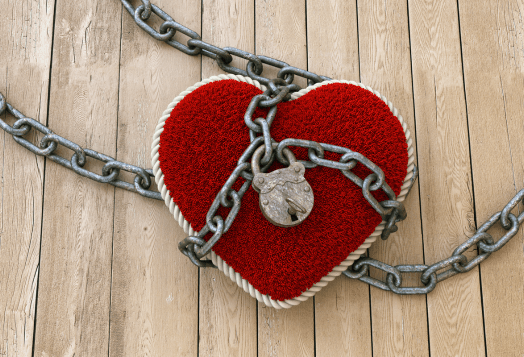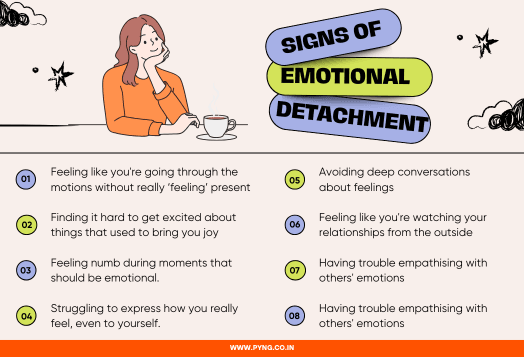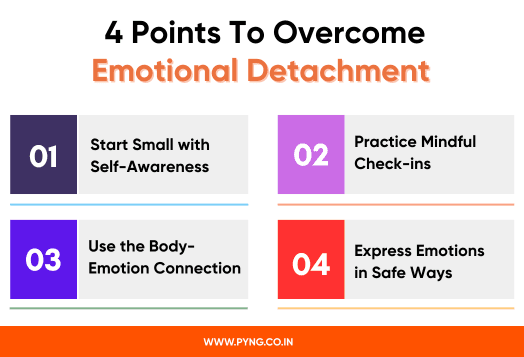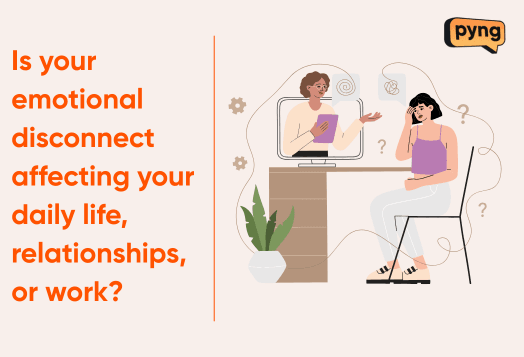Have you ever noticed that conversations that used to spark joy now feel flat and distant?
Have you ever sat with someone you care about and still felt far away from them?

You might be experiencing emotional detachment.
Let's talk about this together, because understanding what's happening in your emotional world is the first step toward reconnecting with yourself and the people you care about.
What Does Emotional Detachment Actually Mean?
Think of emotional detachment as your mind's way of putting up a protective shield. In simple terms, it means feeling disconnected from your own emotions or finding it hard to connect emotionally with others.
Dr. Jonice Webb, a clinical psychologist, explains that emotional detachment might keep you safe from pain, but it also keeps out joy, love, and meaningful connections.

Let’s take an example of a woman who got divorced. During family gatherings, she felt she was physically present, laughing at the right moments, but felt like she was watching everything from behind glass. This emotional disconnect wasn't because she stopped loving her family - her mind was simply protecting her from feeling too much while she healed.
Signs of Emotional Detachment You Might Recognise
Sometimes we don't even realise we've become emotionally disconnected until someone points it out, or we notice patterns in our relationships.
Here are some gentle signs to look out for:

A published research shows that emotional detachment in relationships often develops as a coping mechanism. Your brain essentially says, ‘If I don't get too attached, I won't get hurt as badly.’
How Emotional Detachment Shows Up in Real Life
Let's look at some scenarios you might find familiar:
The Work Friend Situation:
Let’s take an example of a man named Jake. He noticed he could chat easily with colleagues, but when his work friend opened up about her anxiety, he felt uncomfortable. This wasn't because he didn't care - he just couldn't access his empathy in that moment.
The Relationship Struggle:
Let’s say a woman named Sarah found herself pulling away when her partner tried to discuss their future together. Important conversations felt overwhelming, so she'd become distant or avoid them entirely.
These detachment issues were creating a cycle where her partner felt rejected, leading to more conflict and more withdrawal.
Dr. Sue Johnson, creator of Emotionally Focused Therapy, notes that when we experience emotional disconnection, we often create what she calls "negative cycles" in relationships.
Why Do We Become Emotionally Detached?
Understanding the ‘why’ can help reduce self-judgment. Emotional detachment rarely happens overnight - it's usually your mind's response to:
- Past Hurt: Maybe you've been betrayed, experienced loss, or gone through trauma, which can influence emotional attachments. Your brain remembers that emotions can lead to pain, so it tries to protect you.
- Overwhelming Stress: When life feels chaotic, sometimes shutting down emotionally feels like the only way to cope.
- Mental Health Conditions: Depression, anxiety, and PTSD can all contribute to feeling emotionally numb or disconnected.
How to Overcome Emotional Detachment: Gentle Steps Forward
The good news? Emotional detachment isn't permanent. With patience and the right approach, you can reconnect with your emotional world. Here are some research-backed strategies:

1. Start Small with Self-Awareness
Begin by simply noticing when you feel disconnected. Keep a gentle mental note: ‘I'm feeling detached right now.’ Dr. Dan Siegel calls this ‘name it to tame it’ - simply acknowledging the feeling can start to shift it.
2. Practice Mindful Check-ins
Set a phone reminder to ask yourself three times a day: ‘What am I feeling right now?’ Even if the answer is ‘nothing’ or ‘numb,’ that's still valuable information.
3. Use the Body-Emotion Connection
Research shows that emotions live in our bodies as much as our minds. Try this: When you notice detachment, place your hand on your heart and take three deep breaths. This simple act can help you reconnect with yourself.
4. Express Emotions in Safe Ways
Start with low-stakes emotional expression. Write in a journal, talk to a pet, or even practice expressing feelings out loud when you're alone. The goal isn't to feel everything intensely - it's to gradually rebuild your emotional vocabulary.
How to Emotionally Detach from Someone When Needed
Sometimes, the question isn't how to reconnect, but how to emotionally detach from someone who's causing you harm. This is different from unhealthy detachment - it's about creating boundaries:
- Set clear limits on contact and stick to them
- Practice the ‘grey rock’ method - be polite but boring in interactions
- Focus on your own healing rather than trying to change them
- Seek support from friends, family, or a therapist
When to Seek Professional Help
If your emotional disconnect is affecting your daily life, relationships, or work, it might be time to talk to a professional.
Therapies like Emotionally Focused Therapy (EFT) and Cognitive Behavioural Therapy (CBT) have strong research support for addressing detachment issues.
A therapist can help you understand whether your detachment is protective (and perhaps needed) or whether it's keeping you from the connections you want.

Moving Forward with Compassion
Remember, emotional detachment often develops for good reasons - it's your mind trying to keep you safe. The goal isn't to judge yourself for feeling this way, but to gently explore whether this protection is still serving you.
Recovery isn't linear. Be patient with yourself as you navigate this journey back to emotional connection.
Your feelings matter, your relationships matter, and you deserve to experience the full spectrum of human emotion, including joy, love, and deep connection. Taking the time to understand and address emotional detachment is a brave step toward a more fulfilling emotional life.
Remember that reaching out for support - whether to friends, family, or a mental health professional - is a sign of strength, not weakness. You don't have to figure this out alone.
Disclaimer: This information provided is intended for general informational purposes only. It is not a substitute for professional advice or guidance. For personalised recommendations or specific concerns, please consult a certified professional.




